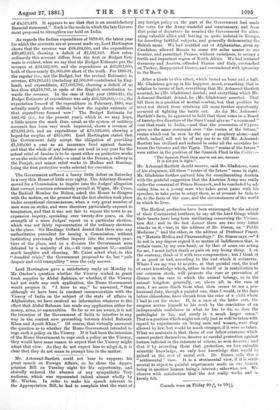After a tirade to this effect, which lasted an hour
and a half, Mr. Gladstone got up in his happiest mood, remarking that in relation to issues of fact, everything that Mr. Ashmead-Bartlett asserted, he (Mr. Gladstone) denied ; and everything which Mr. Ashmead-Bartlett denied, he (Mr. Gladstone) asserted. That left them in a position of mortal combat, but that position he must not shrink from retaining till some further opportunity occurred of fighting the battle out. As for Mr. Ashmead- Bartlett's facts, he appeared to hold that three votes in a Board of twenty-five directors of the Suez Canal give us "a command" over that route to India,—and that the possession of Cyprus gives us the same command over "the routes of the future," routes which can be seen by the eye of prophecy alone,—and which, indeed, will not be of any use to us till Mr. Ashmead- Bartlett has civilised and reduced to order all the countries be- tween the Orontes and the Tigris. These " routes of the future " wore rather in the position of the Spanish Fleet in the Critic :— " The Spanish Fleet thou meat not see, because
It is not yet in sight."
Mr. Ashmead-Bartlett should reserve, said Mr. Gladstone, some of his eloquence, till these "routes of the future" came in sight. Mr. Gladstone further quizzed him for complimenting Austria with the grateful suggestion that the Austrian Army was really under the command of Prince Bismarck, and he concluded by ad- vising him, as a young man who takes great pains with his speeches, to take pains to adapt them, as at present he fails to do, to the facts of the case, and the circumstances of the world in which he lives.






























 Previous page
Previous page